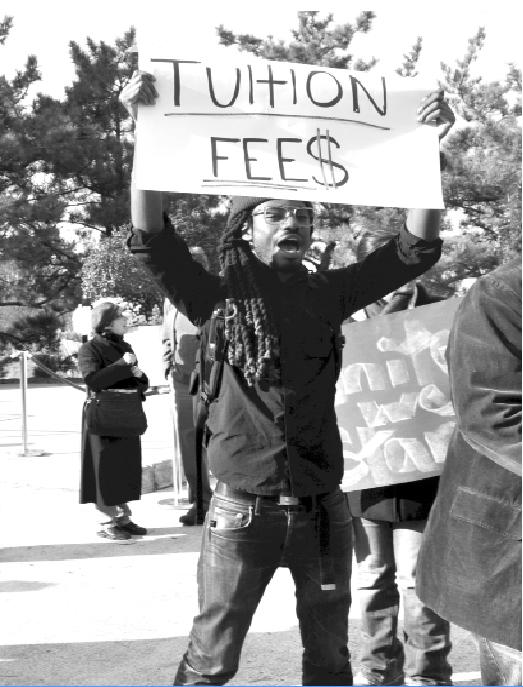Approximately 50 UMB students and faculty showed up for UMass President Robert Caret’s inauguration last week, but they weren’t there to celebrate. They marched in front of the JFK Library with picket signs saying, “Stop privatizing UMB.” It got the president’s attention.
In an interview broadcast on WGBH Greater Boston’s website later, President Caret agreed with protestors, saying that fees are “on the edge of unreasonable.” He also acknowledged that continued privatization of the UMass system would make the university “less and less accessible, and less and less affordable.”
Among the students in attendance were Rob Birmingham and Keegan O’Brien, both members of Occupy UMass, a subgroup of the national Occupy movement, which largely focuses on economic issues.
“We are here to show the incoming president that students and faculty are strongly opposed to the project of privatization and the adverse effect it has on the poorer communities,” O’Brien summarized the message of the protestors. “We hope this demonstration will draw more students into the movement,” he added.
Birmingham said that the larger goal of the protest and other acts of civil disobedience are “to achieve a fully state-run, fully state-funded, public higher education.”
Protest organizer Gary Zabel, senior lecturer in the philosophy department, echoed this sentiment.
“We wanted to send two messages,” Zabel said. “One to Caret, asking him to roll back fees, and the other to UMB administration, especially the chancellor and provost, asking them to suspend the implementation of the strategic plan until we can organize a democratic conversation on campus involving everyone affected.”
The University’s website describes the 25-year Master Plan as “the physical realization of the university’s strategic vision: becoming a model student-centered, urban public research university.”
The website also provides a flowchart of the “decision-making framework” which involves, among others, the President’s Office, an internal steering committee, the chancellor, the executive staff, the UMass Board of Trustees and the Massachusetts Division of Capital Asset Management.
The first stage of the Master Plan, scheduled to be completed in 2017, is projected to cost $500 million.
According to Zabel, the plan is a big step towards the privatization of the University. He claimed that the high research model that UMB is moving toward would mean more corporate funding. And with corporate funding, he said, comes corruption.
President Caret blamed the state for the 7.5% fee increase in the past academic year, during his WGBH interview.
“[What the students] need to understand is that it’s not the university raising fees. It’s the state cutting subsides,” he said.
Caret also explained that in 2007 the state provided 50% of the system’s education budget, while now the state is only providing 30%, and “as the state piece goes down, the student piece goes up.”
“What we need to do is work together with the students, with the faculty, and with the staff, to get the state to understand what used to be 50-50 is now 70-30,” the president said. “I don’t think that it’s fair either, and I do agree that we should take our fees back down.”
UMB administration could not be reached for comment.






















































